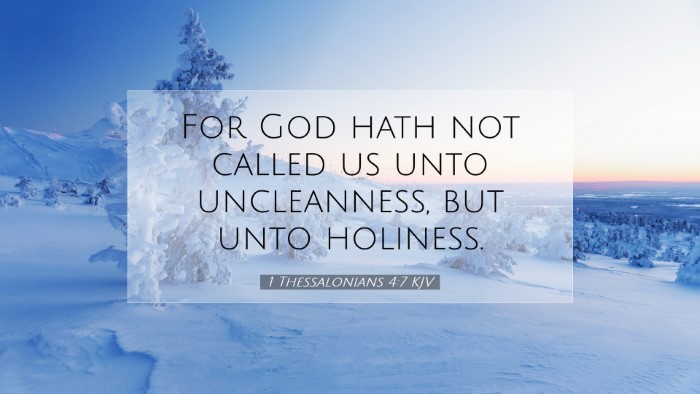Commentary on 1 Thessalonians 4:7
Bible Verse: "For God hath not called us unto uncleanness, but unto holiness."
Introduction
The epistle of 1 Thessalonians is rich in theological insight and practical instruction. In this particular verse, Paul emphasizes the distinct calling of Christians to a life of holiness, which serves as a fundamental principle for living out one’s faith. This commentary seeks to explore the deeper meanings within this verse, drawing from public domain commentaries to illuminate its application for contemporary believers.
The Context of 1 Thessalonians
The Apostle Paul, writing to the Thessalonian church, addresses a community grappling with teachings and lifestyles that challenge their faith. In his letter, Paul provides encouragement and exhortation, reminding them of their calling in Christ. Understanding the significance of this calling is essential in grasping the exhortation found in 1 Thessalonians 4:7.
The Nature of the Divine Call
Paul asserts that God has called believers not unto uncleanness, which can be understood both morally and spiritually, but unto holiness. Commentators universally agree that this calling is an invitation to live in accordance with God’s nature, which is wholly pure and separated from sin.
- Matthew Henry emphasizes that holiness is not merely a suggestion but a command, indicating that true faith manifests in a life dedicated to moral purity.
- Albert Barnes elaborates that the term "uncleanness" reflects a broader spectrum of sin, including sexual immorality, and contrasts it sharply with the higher calling to which believers are summoned.
- Adam Clarke points out that this verse underlines the distinctiveness of the Christian vocation, illustrating that believers must not conform to worldly standards but strive for a life that mirrors God’s holiness.
Cultural Context
In the Greco-Roman world, the culture was steeped in practices contrary to the values of the Christian faith. The Thessalonian believers faced external pressures to engage in immoral lifestyles. Paul’s message rings with urgency as he categorically states that their calling is to reflect God's righteousness amidst a corrupt society.
Holiness as a Divine Attribute
The call to holiness stems from God’s character. As stated in 1 Peter 1:15-16, believers are to be holy as God is holy. Understanding holiness as an attribute of God helps believers appreciate the seriousness of this calling. It invites reflection on how one’s life aligns with this divine standard.
The Practical Outworking of Holiness
Holiness must be lived out practically in the believer's life. It involves a daily commitment to ethical living that aligns with God’s standards. This encompasses not only personal conduct but also relationships within the community of faith.
- Matthew Henry highlights that living in holiness includes a transformation in behavior, speech, and relationships, urging believers to embody purity in their daily interactions.
- Albert Barnes identifies that this turning away from uncleanness may involve repentance, a change of heart, and a conscious decision to pursue righteousness.
Holiness and the Holy Spirit
The role of the Holy Spirit is also crucial in the pursuit of holiness. The Spirit empowers believers to live in a way that is reflective of God’s nature, providing both conviction and strength. Paul’s words suggest that holiness is not an abstract ideal but a relational dynamic where believers cooperate with divine grace.
The Importance of Community
The instruction in this verse is not given in isolation but within the context of community. The church must collectively pursue holiness and support one another in this pursuit. The Thessalonian church is urged to hold each other accountable, creating an environment conducive to spiritual growth.
Conclusion
In 1 Thessalonians 4:7, Paul outlines the Divine calling that believers are to embrace—a calling anchored in holiness. The insights drawn from the commentaries of Matthew Henry, Albert Barnes, and Adam Clarke illuminate both the theological depth and practical implications of this verse. For today’s pastors, scholars, and students, the overarching message remains clear: to be called by God is to be called into a transformative journey towards holiness—a journey that not only affects individual lives but also impacts the wider community of faith.
This pursuit of holiness requires intentionality, reliance on the Holy Spirit, and a commitment to living out the implications of the Gospel in a world that often stands in stark contrast to God’s will. Let this verse be a reminder of the high calling we have in Christ and the profound impact our lives can have on the world around us.


